This page contains affiliate links. As an Amazon Associate I earn from qualifying purchases. Learn more

Most golfers underestimate the importance of selecting the correct golf shaft and tend to focus on the grips and the head of their clubs. Knowing what shaft works best for you, comes down to understanding what your tendencies and patterns are in relation to ball flight and swing characteristics.
The shaft affects your clubs performance on everything from launch, spin, and speed. The wrong shaft can cause the ball to launch too low, too high or spin too much, causing you to lose distance.
In this article we have reviewed a few of the best golf shafts on the market today as well as explain the importance of a good shaft and how it can affect your game.
At a Glance: Best Golf Shafts to Buy
In the comparison table below, we’ve highlighted some of the most important features of each product. You’ll find more detailed information about each product later in the article.
| PICTURE | NAME | RATING | SHOPS |
|---|---|---|---|
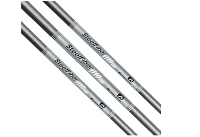
1
|
Aerotech Steel Fiber i110 Iron Shafts
Show more
|
||
|
Price
Quality
Accuracy
Durability
Customer Reviews
|
|||
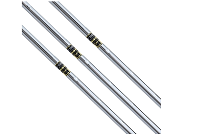
2
|
Dynamic Gold True Temper Shaft
Show more
|
||
|
Price
Quality
Accuracy
Durability
Customer Reviews
|
|||
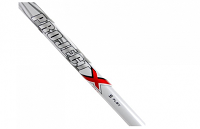
3
|
TaylorMade Project X PXV Stiff Driver Shaft
Show more
|
||
|
Price
Quality
Accuracy
Durability
Customer Reviews
|
|||
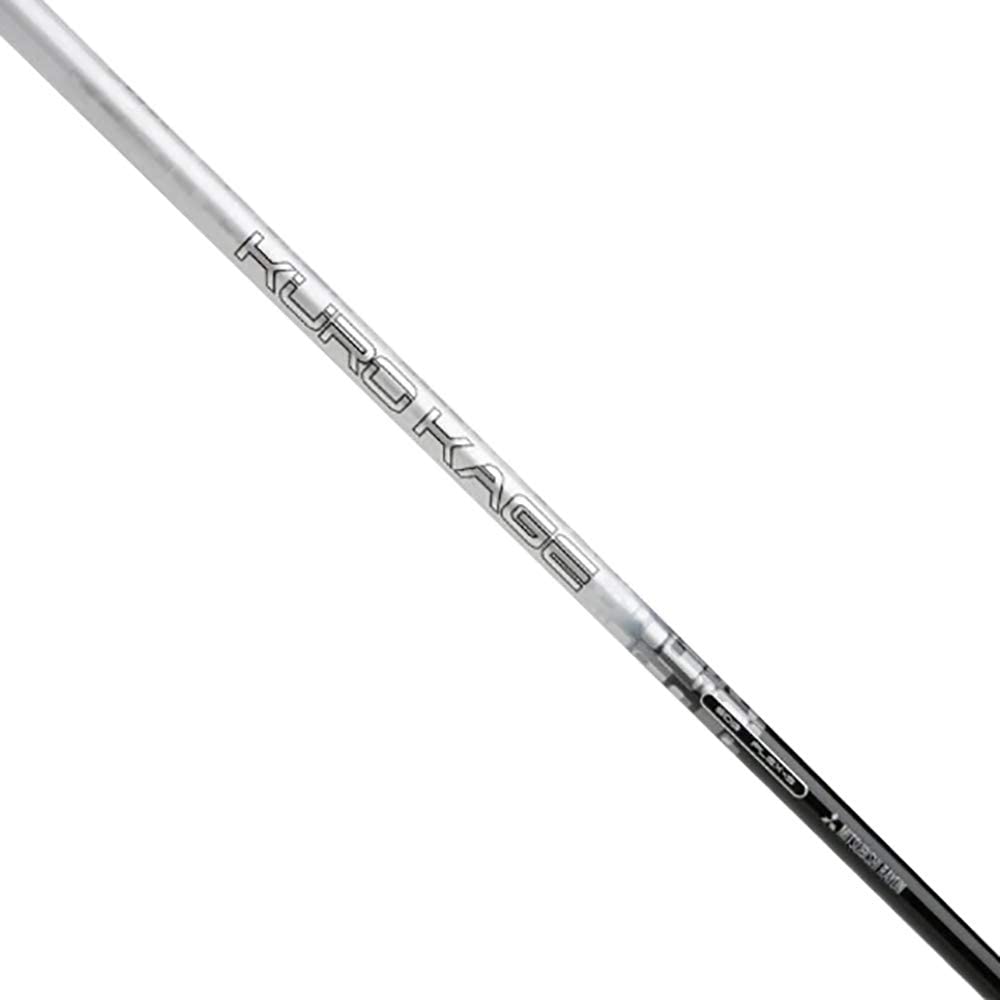
4
|
Mitsubishi Rayon Kuro Kage Silver Graphite Wood Driver Shaft
Show more
|
||
|
Price
Quality
Accuracy
Durability
Customer Reviews
|
|||
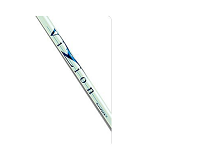
5
|
Accuflex Vizion Ultralite White 55gram Golf Wood Shaft
Show more
|
||
|
Price
Quality
Accuracy
Durability
Customer Reviews
|
|||
5 Best Rated Golf Shafts Reviewed

- 59 miles of steel fiber covers surface of each shaft
- Balanced to offer equal weight across all sizes
- Comes in 3 types of stiffness
- Not the cheapest option
- More spin and launch a little lower
- 59 miles of steel fiber covers surface of each shaft
- Balanced to offer equal weight across all sizes
- Comes in 3 types of stiffness
- Not the cheapest option
- More spin and launch a little lower
Golfers who are sensitive to weight reduction in their golf shafts like the SteelFiber i110, taking advantage of the accuracy, consistency and vibration dampening of the SteelFiber shaft while maintaining a similar ball flight to a much heavier steel shaft.
They are only steel on the outside, and the core is graphite, making them lighter than your average steel shafts and a better fit for the average golfer. The length ranges from 36 1/2-40 inches.
Theses shafts are designed to weigh the same no matter how long they are, which makes for a balanced set of clubs for those who want to try different lengths and see how they work for them.

- Variable Wall Technology for exceptional performance
- You choose the flex and length
- Offers low, penetrating ball flight
- Extensive warranty
- Too heavy for some golfers
- Grips are not included
- Variable Wall Technology for exceptional performance
- You choose the flex and length
- Offers low, penetrating ball flight
- Extensive warranty
- Too heavy for some golfers
- Grips are not included
Dynamic Gold lets you pick from not only different lengths, but also different flexes to get just the right fit for you. The Variable Wall Technology and a tour-proven step pattern provide exceptional performance for serious golfers. This high-flex, tour-weight steel golf shaft is designed for skilled players seeking a low, penetrating ball flight for optimum control and accuracy.
The shaft offers controlled steady flight and the tapered tip makes for a very comfortable golfing experience.
They also offer extensive customer support to help you with any questions you have and to ensure your club is built to your specifications.The clubs are covered by an extensive warranty, which is a good sign of the quality of these shafts.

- Great price and value
- Very lightweight shaft
- Great distance and response
- Only works with some driver heads
- Provides more spin than some golfers want
- Great price and value
- Very lightweight shaft
- Great distance and response
- Only works with some driver heads
- Provides more spin than some golfers want
The graphite Project X by Talormade is specifically for drivers and stays consistent even with amateur golfers. The stiffness, weight, spin, and torque are all labeled right on the shaft. It helps you to be the champion with unbeatable accuracy.
TaylorMade is serious about providing excellent customer service, so they often take special requests on their shafts, if you have any. Also these come pre-assembled for easy installation.
You will have to contact them directly for customized orders, though. While this is made for the Project X driver specifically, it fits most drivers.

- Ideal for those have under 100 mph swing speed
- Lower spin performance than the original kuro kage
- Dual core titanium nickel wire in tip
- Does not include the tip
- Heavier than other shafts
- Ideal for those have under 100 mph swing speed
- Lower spin performance than the original kuro kage
- Dual core titanium nickel wire in tip
- Does not include the tip
- Heavier than other shafts
The Kuro Kage comes with a dual core titanium nickel, wire in tip section to increase stability at impact for accuracy. This shaft is great for golfers who have under 100 mph swing speed.
The variable torque system makes it easy to fit into players of all swing speeds and feel preferences.
It is a heavier driver shaft, and that factor helps to increase the accuracy and comes with over 15% more carbon fiber and 13% less resin as compared to traditional prepregs.

- Can help gain 20 - 30 yards in distance
- Ultralite golf shaft technology
- Lightest shaft of the AccuFLEX "Club Builders" series
- Not as durable as steel or graphite
- Maybe too light for some players
- Launch could be higher
- Can help gain 20 - 30 yards in distance
- Ultralite golf shaft technology
- Lightest shaft of the AccuFLEX "Club Builders" series
- Not as durable as steel or graphite
- Maybe too light for some players
- Launch could be higher
It’s pretty rare to find wooden golf shafts, so this maybe worth it for the novelty and prestige of that material on its own. These clubs can help you gain twenty to thirty yards making these great for velocity and momentum.
They also offer a variety of flex choices for different club fit.
This shaft is light in your hands, and is the lightest for this brand of shafts.
What to Consider before You Buy
You can find the right shaft for your golfing needs, if you consider a few important factors as you shop:
- Type – Golf shafts are primarily available in two types, steel shafts and graphite shafts. Steel shafts can be Stepped Steel Shafts and Rifle Steel Shafts while Graphite shafts are Multi-Material Shafts, Titanium Shafts, Nanofuse Shafts.
- Shaft length – Your height partially determines the length of shaft you should have on your golf club, but so too does your arm length, which can be independent of your height. The distance from your wrist to the floor is the best indicator of how to find the right length of shaft. If the distance is from 29-31 inches, then you will need a shaft length of 37 inches. Anyone with a distance from the wrist to the floor of 41 inches or more will do best with a club length of 39 ½. It’s important to get the right length for a solid strike every time you swing your club.
- Distance Control – Generally, players are looking for either Distance, Control or both. The lighter the shaft, the longer the overall club length and more flexible the shaft is (within the players flex range), the greater the potential for distance gain. The heavier the shaft, the shorter the overall length of the club and the stiffer the shaft is (within the players flex range), the greater potential for control (tighter shot dispersion). The ultimate goal in shaft fitting is to find the best combination of both Distance and Control.
- Strength – Steel shafts tend to be heavy, durable and offer a low torque rating. Graphite shafts are lighter, less durable and have a range of torque ratings based on their construction. You’ll have to figure out which type works best for you.
- Torque – How much torque a shaft has tells you how much it will twist when you swing it. Higher torque ratings mean a softer feel to the swing. Conversely, a lower torque rating means a harder, stiffer feel. There isn’t a set torque rating that is considered the best for everyone. You just have to find what works well for you. If your shaft broke and needs replacing, you can base your new purchase off of how you felt about the previous shaft.
- Cost – Typically, when you go for the more expensive shaft, you would expect higher quality, but that’s not always the case. Cost is not an absolute indicator of high quality construction or design, so take a moment to examine what you are getting and compare it to your other options before you pay a lot for a golf club shaft.
Final Thoughts
You may not think your club’s shaft affects your game, but, each shaft has its own torque rating, which tells you how well it swings and how much resistance is created when you move it through the air. The shaft can be weak or strong, and that may determine how heavy it is, how flexible it becomes when swung and how long it will last. All of these things can affect your game. If you are hitting the ball with a flexible shaft, you might end up hitting the ball too high or it may spin too much.
On the other hand, a shaft that is too stiff may result in ball flight trajectory that is too low, golf balls that do not spin as hoped, or may not go the distance. A club shaft that offers impressive drive distance, control and direction, while optimizing ball flight and accuracy is what you want. The bottom line is poor quality shafts are not only bad investments but cause accuracy problems.





